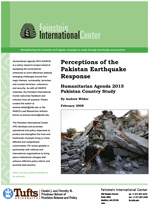The devastating earthquake that struck northern Pakistan and the disputed territory of Kashmir in October 2005 killed approximately 75,000 people, injured 70,000 more, and left an estimated 3.5 million people homeless. The subsequent relief effort, which was led by the Pakistan Army and included local citizens, national and international aid agencies, US and NATO military forces, and even Islamic militant groups, was one of the most effective responses ever to a natural disaster of this magnitude. Andrew Wilder examines the earthquake response in the latest in a series of the Center’s reports on the state of humanitarianism.
This Humanitarian Agenda 2015 study, “Perceptions of the Pakistan Earthquake Response,” records the perceptions of both aid providers and aid recipients in the earthquake-affected areas of Pakistan and Pakistan-administered Kashmir. In particular, Wilder examines perceptions regarding the following four issues: the universality of humanitarian principles, the impact of the War on Terror on the earthquake response, the role of the Pakistan Army in leading the response, and the security of humanitarian aid workers.







